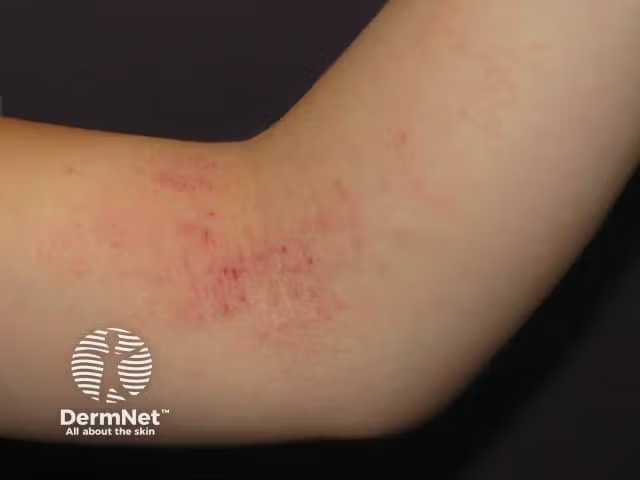- Case-Based Roundtable
- General Dermatology
- Eczema
- Chronic Hand Eczema
- Alopecia
- Aesthetics
- Vitiligo
- COVID-19
- Actinic Keratosis
- Precision Medicine and Biologics
- Rare Disease
- Wound Care
- Rosacea
- Psoriasis
- Psoriatic Arthritis
- Atopic Dermatitis
- Melasma
- NP and PA
- Skin Cancer
- Hidradenitis Suppurativa
- Drug Watch
- Pigmentary Disorders
- Acne
- Pediatric Dermatology
- Practice Management
- Prurigo Nodularis
- Buy-and-Bill
Article
Baricitinib Offers Hope for Pediatric Atopic Dermatitis Patients
Author(s):
Results of a new study indicate that baricitinib offers a potential therapeutic option with a favorable benefit-risk profile for pediatric patients with moderate-to-severe AD.
An oral dose of baricitinib (Olumiant; Eli Lilly and Company) 4 mg daily may be a therapeutic option for children with moderate-to-severe-atopic dermatitis (AD), who need systemic therapy, according to a new study.1
Baricitinib, an oral selective Janus kinase (JAK)1/JAK2 inhibitor, is approved in many countries for moderate-to-severe atopic dermatitis (AD) in adult patients who are candidates for systemic therapy. Investigators evaluated the efficacy and safety of 3 doses of baricitinib in combination with low-to-moderate potency topical corticosteroids in pediatric patients with moderate-to-severe AD.
The randomized double-blind, phase 3 study, BREEZE-AD-PED, included 483 patients, between the ages of 2 and 18, who were assigned 1 of 3 dosing regimens (1 mg, 2mg, 4 mg or placebo) for 16 weeks. Patients were then assessed using a validated IGA for AD. The primary endpoint was the proportion of patients achieving a validated Investigator Global Assessment® (vIGA-AD) of 0/1 with a ≥ 2-point improvement at week 16. Secondary endpoints included proportions of patients achieving 75% and 90% improvement in the Eczema Area and Severity Index (EASI75, EASI90), 75% improvement in the SCORing Atopic Dermatitis (SCORAD75), mean change from baseline in EASI score, and proportion of patients achieving a 4-point improvement in the Itch Numeric Rating scale (NRS) for patients ≥10 years.
According to the findings, baricitinib 4-mg achieves statistically significant improvement vs the placebo on all 16-week endpoints. Patients also noted an improvement in the ability to fall asleep and in a reduction of corticosteroid use. Clinically significant improvement in itch was seen starting at week 3 and sustained through week 16. The improvement in sleep was observed from week 4 through week 16.
1.6% of the patients discontinued the study due to adverse events (1.6% for placebo and 0.6% for barititinib-treated).
No deaths, venous thromboembolic events, arterial thrombotic events, major adverse cardiovascular events, malignancies, gastrointestinal perforations, or opportunistic infections were reported.
Study investigators stated that while these results are reassuring, long-term follow-up is needed regarding the use of systemic JAK inhibitors in pediatric patients.
In June 2022, baricitinib was approved by the US Food and Drug Administration to treat patients with alopecia areata. It is also approved in the US to treat rheumatoid arthritis.
Reference
1. Antonio Torrelo, Barbara Rewerska, Maria Galimberti, et al. Efficacy and safety of baricitinib in combination with topical corticosteroids in pediatric patients with moderate-to-severe atopic dermatitis with inadequate response to topical corticosteroids: results from a phase 3, randomized, double-blind, placebo-controlled study (BREEZE-AD PEDS), British Journal of Dermatology, 2023, ljad096, https://doi.org/10.1093/bjd/ljad096






